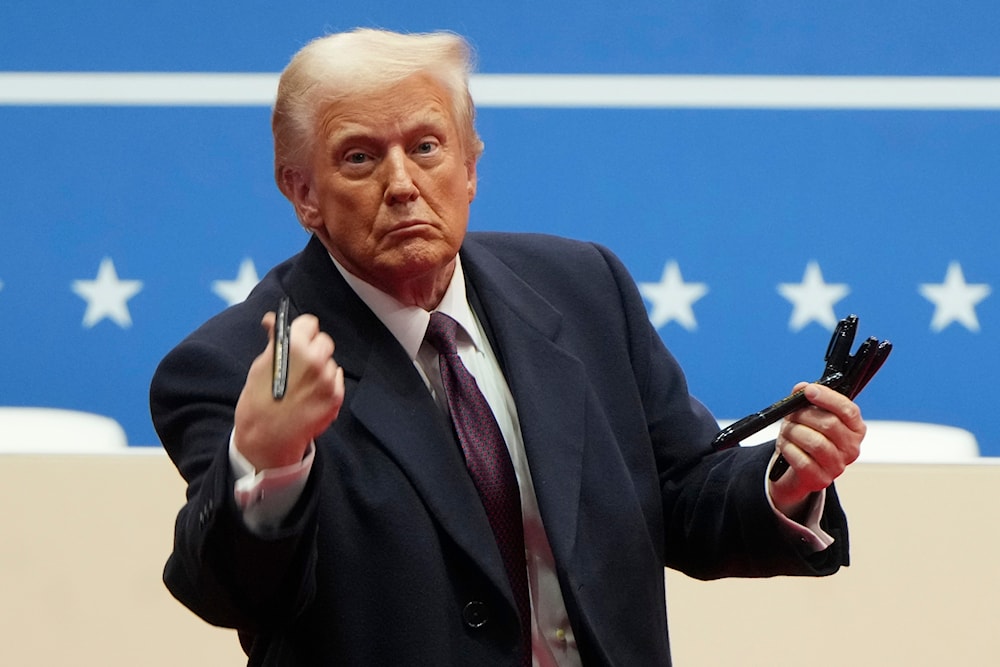Trump tariffs Canada, Mexico, China, escalating trade tensions
Trump’s latest tariffs on Canada, Mexico, and China threaten to increase costs for U.S. consumers and disrupt key industries while escalating tensions in global trade relations.
-

President Donald Trump throws pens used to sign executive orders to the crowd during an indoor Presidential Inauguration parade event in Washington, the United States, on January 20, 2025. (AP)
President Donald Trump imposed new tariffs on major trading partners—Canada, Mexico, and China—on Saturday.
The tariffs include a 25% levy on most exports from Canada and Mexico, and an additional 10% on Chinese goods, on top of existing duties. This move, justified by claims of a national emergency linked to illegal immigration and fentanyl trafficking, threatens significant disruptions in industries ranging from agriculture to automotive manufacturing and energy. The tariffs are also expected to increase costs for US consumers and businesses.
Canada and Mexico are major suppliers of agricultural products, and the auto industry is heavily reliant on these countries, with 70% of light vehicles built in North America destined for the US. The tariffs could drive up vehicle prices, damage supply chains, and result in job losses. Experts warn that the resulting inflation could slow consumer spending and business investment, undermining Trump's economic rhetoric of deregulation and tax cuts.
The Canadian and Mexican governments have vowed to retaliate. Prime Minister Justin Trudeau and Ontario Premier Doug Ford have already signaled they will respond “purposefully and forcefully.” Mexican officials, including President Claudia Sheinbaum, have likewise pledged a measured but firm response, aligning with the private sector’s concerns about the potential economic fallout.
One of the most significant consequences is the impact on US energy markets. Nearly 60% of US. crude oil imports come from Canada, and imposing tariffs on Canadian energy could raise prices, particularly in the Midwest, where oil refineries depend on these imports. While Trump claims these tariffs will incentivize domestic energy production, they risk destabilizing the US energy market and exacerbating inflationary pressures. The recent U.S. licensing of Chevron's operations in Venezuela may help alleviate energy shortages by boosting oil imports, and offering relief amid tariff disruptions.
Read more: Trump reiterates BRICS tariff threat as critical deadlines loom
Mexico promises retaliation against US tariffs
In response to US President Donald Trump's new tariffs, Mexican President Claudia Sheinbaum announced that Mexico will implement "Plan B," a series of retaliatory tariffs and non-tariff measures to protect its economic interests.
Sheinbaum also strongly rejected accusations from the US government that her administration has an "intolerable alliance" with drug trafficking groups. On social media, Sheinbaum called the White House's claims "slander," emphasizing that if any "alliance" exists, it is between US gun shops and criminal groups in Mexico.
She further criticized Washington for not addressing domestic drug issues, particularly the consumption of fentanyl, and accused US authorities of failing to combat street drug sales and money laundering, which fuel violence and addiction in both countries.
Read more: Trump renaming of Gulf of Mexico only applies to US: Mexican president
Canada responds to US with 25% levies on select goods
Meanwhile, Canadian Prime Minister Justin Trudeau said that his government will respond to Trumps tariffs with 25% levies of its own on select American goods.
"Canada will be responding to the US trade action with 25 percent tariffs against Can$155 billion ($106 billion) worth of American goods," he emphasized, as he warned of a fracture in longstanding Canada-US ties.
China vows to resolutely safeguard its interests
China condemned new tariffs imposed by Trump, vowing to take "corresponding countermeasures" to protect its interests. The Ministry of Commerce expressed strong dissatisfaction and stated it would file a complaint with the World Trade Organization (WTO).
"China is strongly dissatisfied and firmly opposes this," Beijing's commerce ministry said in a statement, adding that it would file a claim against Washington at the World Trade Organization.
Foreign Ministry spokesperson Mao Ning reiterated that trade wars have no winners, emphasizing that such tariffs are harmful to both China and the US, as well as the global economy.

 4 Min Read
4 Min Read








